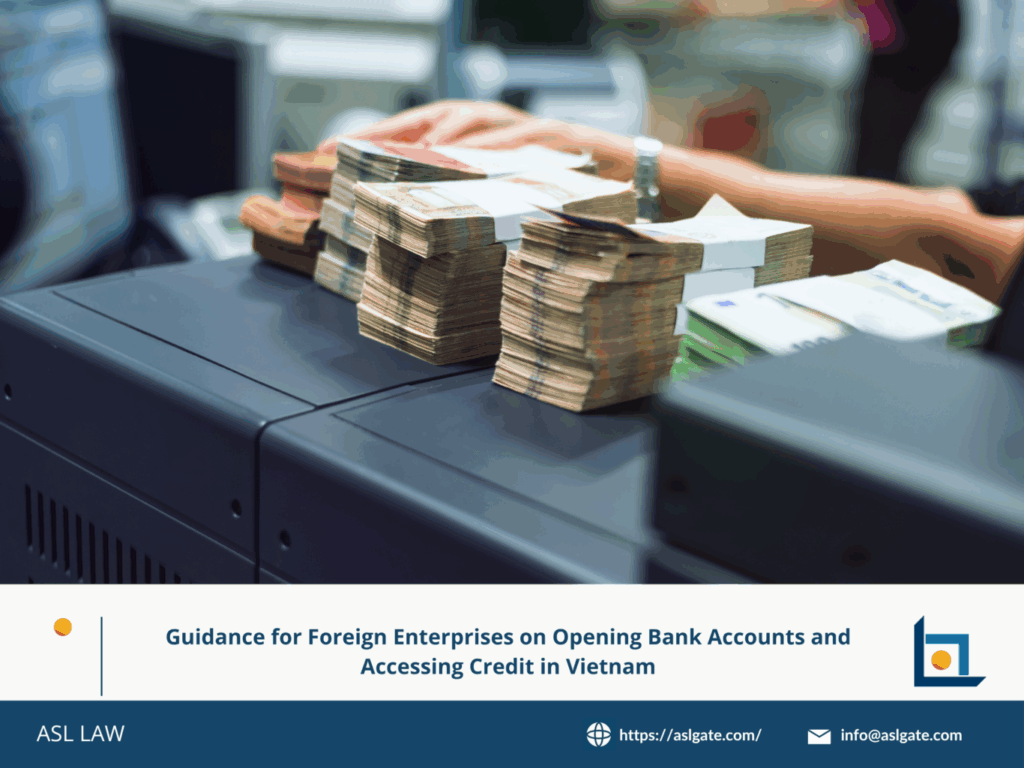As Vietnam continues to reinforce its position as a leading investment destination in the Asia-Pacific region, the demand for account opening and access to credit by foreign-invested enterprises (FIEs) has been on the rise. However, these activities are not merely administrative procedures—they are tightly regulated under Vietnam’s financial, banking, and oversea investment legal framework.
This article analyzes the key legal considerations foreign enterprises should take into account when opening payment accounts and engaging in loan transactions in Vietnam.
1. Legal Framework and Principles of Foreign Exchange Management
Under the 2005 Ordinance on Foreign Exchange (amended in 2013) and its guiding regulations, all receipts and expenditures related to foreign direct investment (FDI) in Vietnam must be conducted through a direct investment capital account opened at a licensed credit institution authorized to conduct foreign exchange operations.
Therefore, opening a bank account in Vietnam is not only a matter of convenience but also a legal obligation for foreign investors when contributing capital, remitting profits, or conducting financial transactions related to an investment project.
2. Distinction Between Account Types: Capital Accounts vs. Payment Accounts
Depending on their form of presence in Vietnam, foreign enterprises may need to open:
- FDI Capital Account: Required for foreign investors who establish company in Vietnam or acquire shares or capital contributions that confer management rights in a Vietnamese enterprise.
- Payment Account (in VND or foreign currency): Used for routine domestic transactions such as salary payments, service fees, and operational expenses.
Identifying the correct account type and understanding its respective functions is critical to complying with regulations on fund transfers, capital flow recording, and anti-money laundering (AML) measures under the supervision of the State Bank of Vietnam (SBV).
3. Regulations on Domestic Loans and Credit Access
Oversea investment enterprises are permitted to borrow from credit institutions in Vietnam but must meet specific legal conditions under:
- The Law on Credit Institutions 2010 (as amended in 2017)
- Circular No. 12/2022/TT-NHNN on foreign borrowing and foreign debt management
- Internal lending policies of individual banks
Key legal considerations include:
- Restrictions on loan purpose: Loans must serve legitimate production or business operations within Vietnam. Borrowing for outbound investment or real estate speculation is typically disallowed.
- Financial capability requirements: Lenders may request financial statements, audited reports, projected cash flows, and collateral documentation.
- Foreign currency loans: Only allowed in special cases where the enterprise generates foreign currency revenue from export activities.
4. Other Legal Compliance Notes
- Compliance with tax and AML laws: Enterprises must fulfill tax declaration obligations and be able to justify the origin of funds upon request.
- Profit remittance abroad: Allowed only after full settlement of financial obligations and completion of independent audits.
- Legal due diligence for projects: For medium- and long-term loans, banks may require legal documentation proving the project’s legitimacy and the investor’s legal capacity.
5. Recommendations for Foreign Investors
To ensure legal compliance and minimize risk exposure, foreign investors should:
- Consult early with legal professionals specializing in foreign investment and banking & finance to select an appropriate account structure.
- Coordinate closely with credit institutions to prepare comprehensive documentation and understand each bank’s internal processes.
- Stay updated on legal developments, especially as Vietnam continues to revise regulations on capital control and foreign exchange management in line with international standards.
ASL Law is a leading full-service and independent Vietnamese law firm made up of experienced and talented lawyers. ASL Law is ranked as the top tier Law Firm in Vietnam by Legal500, Asia Law, WTR, and Asia Business Law Journal. Based in both Hanoi and Ho Chi Minh City in Vietnam, the firm’s main purpose is to provide the most practical, efficient and lawful advice to its domestic and international clients. If we can be of assistance, please email to [email protected].
ASL LAW is the top-tier Vietnam law firm for Banking & Financial Services. If you need any advice, please contact us for further information or collaboration.

 Tiếng Việt
Tiếng Việt 中文 (中国)
中文 (中国) 日本語
日本語

